Archived Blog Posts
Mold vs. Mildew: Understanding the Key Differences and How to Deal with Them
5/25/2023 (Permalink)
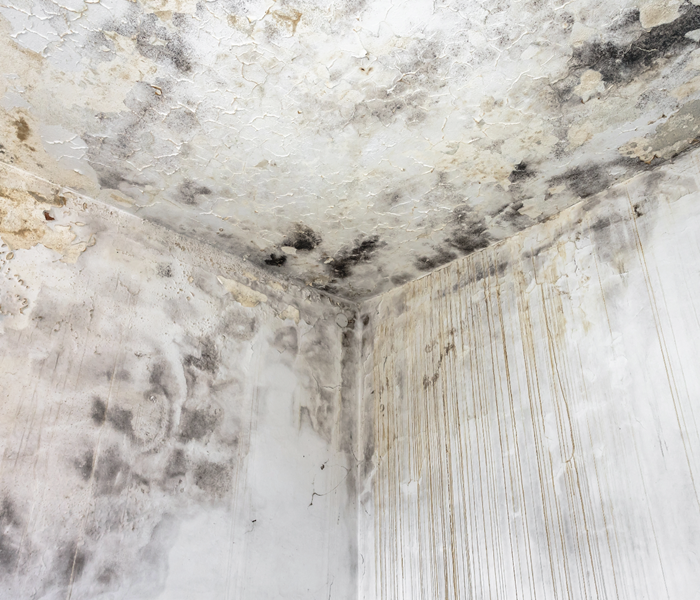 Mold vs Mildew, should be addressed immediately.
Mold vs Mildew, should be addressed immediately.
Mold and mildew are both types of fungi that can grow in damp, warm environments and can be found in various parts of our homes, such as bathrooms, basements, and kitchens. While they may appear similar and are often used interchangeably, there are some key differences between mold and mildew that are important to understand in order to effectively identify and manage them. In this blog, we will explore the differences between mold and mildew.
Definition and Appearance
Mold is a type of fungus that can grow in various colors, such as black, green, or gray, and has a fuzzy or slimy texture. It can penetrate the surface it grows on and can spread easily, both horizontally and vertically. Mold tends to grow in areas with high moisture content, such as water-damaged walls, damp basements, and areas with poor ventilation.
On the other hand, mildew is a type of mold that is specifically identified by its appearance. Mildew is usually white or gray and has a powdery texture. It typically grows on the surface of damp materials, such as bathroom tiles, fabrics, or paper, and is commonly found in bathrooms, kitchens, and other areas with high humidity.
Growth Conditions
Both mold and mildew thrive in damp, warm environments. However, there are some differences in the specific conditions that favor their growth.
Mold typically grows in areas with high moisture content, such as water-damaged walls, leaky pipes, or areas with poor ventilation. It can also grow on organic materials, such as wood, paper, and fabric, and can withstand a wide range of temperatures.
Mildew, on the other hand, tends to grow on the surface of damp materials, such as bathroom tiles, shower curtains, or fabrics, and is commonly found in areas with high humidity, such as bathrooms, kitchens, and basements. Mildew is more commonly found on non-organic materials and prefers a relatively cooler temperature compared to mold.
Cleaning and Prevention
Both mold and mildew should be addressed promptly to prevent further growth. Here are some key steps for cleaning and preventing mold and mildew.
- Clean mildew-infected surfaces with a solution of water and mildew-specific cleaner, which can be found in most grocery or hardware stores.
- Use a scrub brush or a sponge to scrub the affected area thoroughly, making sure to remove all visible traces of mildew.
- Rinse the area with clean water and dry it thoroughly to prevent further moisture buildup.
- Increase ventilation in the affected area by using exhaust fans, opening windows, or using a dehumidifier to reduce humidity levels.
- Avoid leaving damp materials, such as towels or clothes, lying around, and promptly fix any leaks or water damage to prevent future mildew growth.
- Regularly clean and dry surfaces prone to mildew growth, such as bathroom tiles, shower curtains, and window sills, to prevent mildew from returning.
In both cases, it's essential to address the source of moisture and ensure that the affected areas are thoroughly cleaned and dried to prevent further growth of mold or mildew.
Damage Potential
Mold can cause more significant damage compared to mildew due to its ability to penetrate surfaces and spread rapidly. It can cause structural damage to buildings, furniture, and other materials it grows on, and may require professional remediation in severe cases.
Mildew, on the other hand, is typically limited to surface growth and does not penetrate materials like mold does. However, if left untreated, mildew can still cause discoloration and damage to surfaces, especially porous materials such as fabric and paper.
In summary, while mold and mildew are both types of fungi that can grow in damp, warm environments and have some similarities, they have distinct differences in terms of appearance, growth conditions, cleaning and prevention methods, and damage potential.
The Cost of Fire Damage: How Much Revenue Can You Lose and How to Recover
4/10/2023 (Permalink)
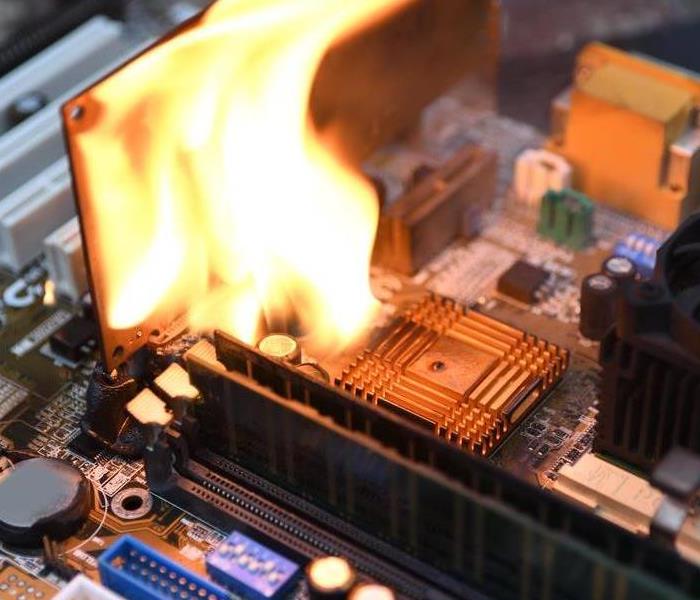 If your electronics have suffered a fire loss, give SERVPRO a call today.
If your electronics have suffered a fire loss, give SERVPRO a call today.
Electronics are a major part of our lives, and they can be destroyed by fire. If you've experienced a fire in your home or business, it's important to know that electronics will likely be damaged. If they aren't cleaned properly, they could cause further problems down the road.
What happens if they aren't cleaned?
Electronics can become damaged when exposed to heat, smoke and ash residue during a fire event. This damage can result in short-circuiting or other issues that could lead to further problems with your devices later on. It's best to clean them immediately after exposure so that their performance doesn't suffer from these effects later on.
Types of Damage Caused by Fire
There are three main types of damage that can occur in a fire: smoke damage, soot damage, and water damage.
Smoke Damage - When you think about the effects of smoke on electronics after a fire, it's easy to imagine that all the smoke will just blow away with the wind once the flames have been extinguished. Unfortunately for your devices this isn't quite true--in fact there are many ways that even small amounts of residual smoke can cause lasting harm to your electronics. The most common way this happens is through condensation within internal components, as temperatures cool down and humidity rises during cleanup efforts following an incident like this one.
Why Cleaning Electronics is Necessary
Cleaning your electronics after a fire is necessary to prevent further damage to the device. When smoke and soot are left on electronic equipment, they can cause corrosion that will damage components and make them unusable.
Cleaners are available for every type of electronic device; however, professional cleaning services provide the best results because they have specialized equipment designed specifically for each type of product (such as televisions or computers). These cleaners know how best to clean each individual model based on its construction materials and specifications--and they know how long it takes for certain parts inside an item's casing before they become damaged by heat exposure during a fire event!
Types of Cleaning Services Available
There are many types of cleaning services available, and each one can be used for different purposes. Exterior and interior cleaning is the most common type of service and includes cleaning your device's body, screens and buttons. Deodorization is another option that helps remove smoke odors from electronics so they smell fresh again. Data recovery services can be used to retrieve any important files that were lost during a fire or other disaster.
Cost of Cleaning Services
The cost of cleaning your electronics depends on the type of service you need and the size of your item. If you're looking for a simple wipe down, it will be less than if you need major repairs or replacement parts. The extent of damage is also a factor in determining how much a repair will cost.
If you're interested in learning more about our services, please feel free to contact us! We'd love to hear from you and help answer any questions that come up during this process.
Cleanup services are available for both residential and commercial customers, so you can rest assured that your devices will be taken care of in the best way possible. Give SERVPRO a call today.
What can cause a flooded basement?
3/28/2023 (Permalink)
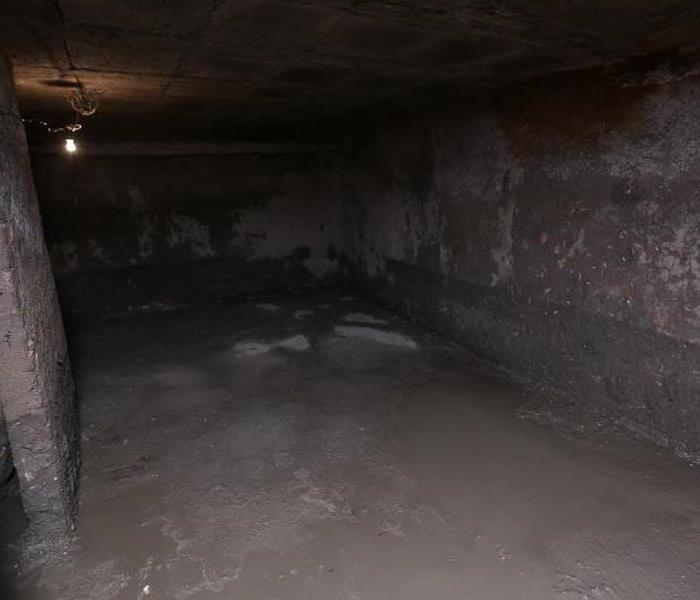 Got a leak in your basement, we can help.
Got a leak in your basement, we can help.
Water damage is one of the most common types of property damage, and it can be caused by many different factors. Some are preventable, while others are not. Regardless of how they happen, water damage can have devastating effects on your home and belongings if you do not take care to address them immediately after they occur. Flooding in basements is a particular concern for homeowners, who rely on their basement to store some of their most valuable possessions as well as provide additional living space during times when all family members are at home full time. In this article we'll discuss some possible causes for flooding in basements so that you can better protect yourself from future incidents!
A foundation crack or other structural problem
If you notice cracks in the foundation of your home or basement, it could be a sign of a structural problem. Foundation cracks are often caused by water infiltration into the soil around the house and can lead to significant damage if left untreated. If you see any signs of cracking around your basement walls and floor, consult with an expert immediately, the sooner they're addressed, the easier they'll be to fix!
If you think there might be something wrong with your foundation but aren't sure where to start looking for problems, consider hiring an inspector who specializes in checking out foundations and other structures like basements. This way he or she will be able to identify potential issues before they become serious problems and help get them fixed quickly so everything stays solid underfoot
A broken sump pump or drain line
To prevent a flooded basement, you should make sure that your sump pump is connected to a drain. If it's not, it can cause water to back up in the house and flood the basement.
Also make sure that your sump pump is big enough for its job. If it isn't, then it may be unable to handle all of the water coming into your home and will overflow or break down, which will cause flooding. Finally, check out our guide on how to maintain and troubleshoot your sump pump so that everything runs smoothly!
A backed-up main drain or sewer line
If you suspect that your main drain or sewer line is backed up, there are a few ways to check. A good first step is to simply look for signs of flooding around the house. If there's water in places it shouldn't be, such as on the floor or outside in a yard, this could be an indication that something has gone wrong with your system. You'll also want to check along any exterior walls for leaks, if you see any discoloration or peeling paint near windows and doors, then there may well be some sort of issue going on underneath those surfaces.
If you find no visible signs of flooding around your home but still believe there might be some kind of problem with either your main drain pipes or sewer lines, it might help identify what caused them if we consider what other factors could have contributed.
A leak in your roof, wall, or foundation
If you have a leak, it's best to fix the problem as soon as possible. The longer you wait, the more damage can be done and the harder it will be to repair. Water damage can lead to a variety of other damages throughout your property if not addressed properly.
Flooded basements are often caused by leaks in roofs or walls, foundation cracks or settling ground around the house, or even bad plumbing work that has resulted in water seeping into your basement through cracks leading down there from upstairs bathrooms or kitchens.
Water damage can be prevented. If you suspect a leak in your home, it's important to act quickly and call a professional plumber. A leaking toilet or faucet may seem like an easy fix, but if left untreated for too long, it could lead to serious problems with your foundation or even mold growth. Always make sure that there are no cracks in the foundation before doing any repairs yourself. Give SERVPRO a call at the first sign of damage.
Six Tips To Protecting Your Home From Water Damage
2/24/2023 (Permalink)
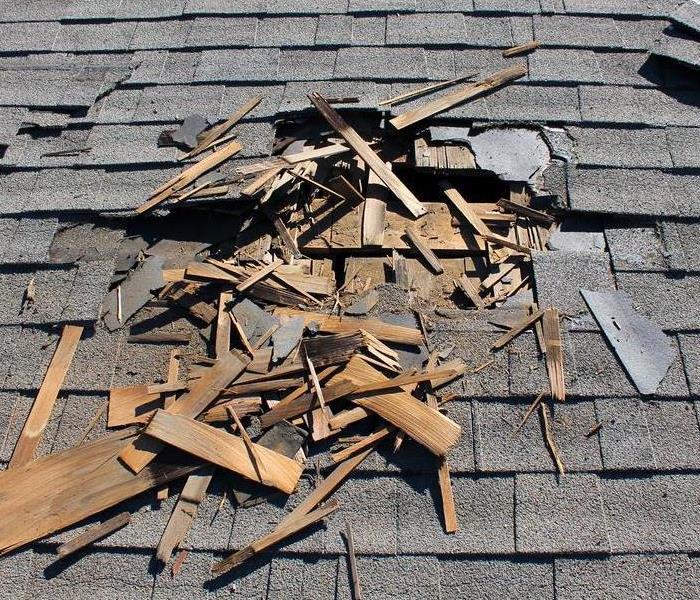 If you suspect a water loss in your home give SERVPRO a call today!
If you suspect a water loss in your home give SERVPRO a call today!
Water is one of the most dangerous threats to your home. It can cause thousands of dollars worth of damage in just a matter of hours and can even lead to mold growth. By taking a few simple steps, you can make sure your home stays safe from water damage every day and throughout the year.
Inspect your roof.
Check your roof for leaks. Roofs are one of the most common places for water damage to occur, so it's important to regularly inspect yours for signs of trouble. Look for damage that may have occurred due to a leaky roof or poor ventilation in your attic, such as mold growth on walls and ceilings near vents and light fixtures.
Inspect insulation around pipes and vents in the attic or crawl space; if it has become wet and moldy, remove it immediately (and replace it with new insulation). Look at wood framing members like joists that support floors above grade level; these should be inspected annually by a qualified professional who can determine whether they need repair or replacement due to rot or decay caused by moisture intrusion into the home's structure."
Check your gutters.
Gutters are a crucial part of preventing water damage in your home, so it's important to keep them clean. At least twice a year, check for clogs and blockage, if you find any, clean them out with a wire brush or cleaning tool designed specifically for this purpose (a stiff wire brush is ideal). If you don't have gutters but think they might be right for you and your home, consider installing them during the next rainy season.
Test your sump pump.
Test your sump pump. Sump pits are designed to collect water and then pump it out of your house, but sometimes they don't work as well as they should. To test yours, first, check the water level in the pit. If there's more than that or if you can't see any water at all, there may be a problem with your sump pump (or possibly even something blocking its intake). Then turn on and off your battery backup system while watching for any changes in water levels--if nothing happens when you turn off the power, this could mean that something has gone wrong with either your battery backup system or another part of its wiring setup. Finally, try turning off the power again while listening closely: if you hear gurgling sounds coming from inside one side of the house followed by loud clanking noises coming from beneath it over time (as though someone was emptying buckets full of rocks into an aquarium), then chances are good that there's something wrong with these pipes too!
Clean dishwasher, fridge, and washing machine hoses.
Dishwashers, fridges, and washing machines have a lot of moving parts that can get clogged with debris over time. This will lead to water leaks that may damage your home's foundation or cause mold growth inside the appliance itself. To prevent this from happening, clean all three appliances' hoses at least once per year by running hot water through them for several minutes (or until it runs clear). If you can't clean them yourself, consider hiring someone who has experience working with these appliances (like an HVAC technician) instead of trying to do it yourself.
Make sure hose bibs are insulated.
Hose bibs are the valves that control water flow in your home. They're often exposed to the elements, which means they can freeze in cold weather, crack in hot weather and rust during wet seasons. If your hose bibs aren't properly insulated, it's a good idea to replace them with ones that have built-in insulation or wrap them with foam pipe insulation before winter sets in. This will help keep them from freezing and bursting open under pressure when you turn on your sprinklers next spring!
Inspect the exterior of your home.
Inspect the exterior of your home. Check for cracks in the foundation, walls, and windowsills. Look for leaks around pipes or water heaters. Check all the sinks and faucets to ensure no small leaks that could potentially turn into larger water damage. Check for stains on ceilings that may indicate water damage caused by a leaky roof or plumbing system.
Water damage can happen at any time, so regular maintenance is the best way to protect your home. Inspect your roof, gutters, sump pump, and other exterior areas for leaks or signs of damage. Water damage can be a big problem for your home and your family. It's important to take steps to protect yourself against water damage by making sure that your home is properly insulated and maintained. If you suspect a water loss in your home give SERVPRO a call today!
What Are the Most Vulnerable Areas of Your Home During a Storm
1/10/2023 (Permalink)
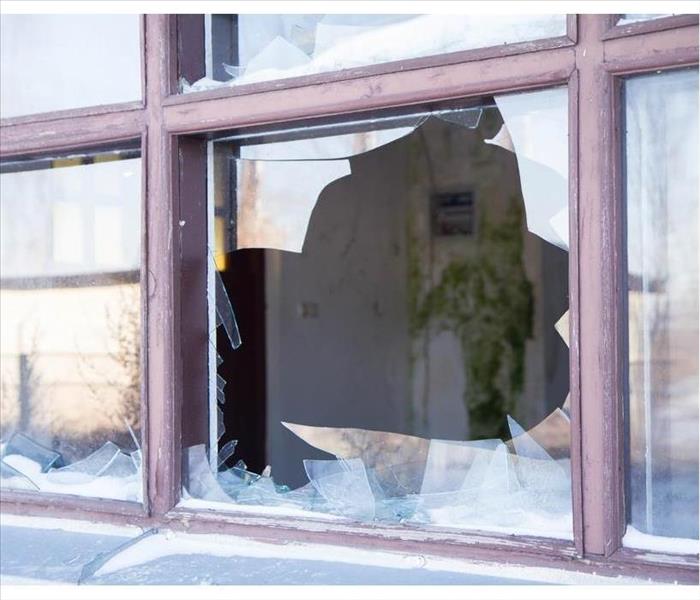 During a storm, wind can blow and break your windows leading to water damage.
During a storm, wind can blow and break your windows leading to water damage.
The best way to protect your home from a storm is to know what areas are most vulnerable to damage. This will help you identify if you need to make any repairs or if there are any safety concerns. You may think that the most important places to focus on would be doors and windows, but these aren't always the most at-risk spots of your house when it comes to storms. Here are some other parts of your home that might need extra attention during bad weather.
Doors
Things like doors are the first line of defense against damage to your home. That’s why it’s so important that they be strong enough to withstand wind, rain, and debris. If a door isn’t properly fortified, it can spell disaster for you and your family during a storm.
Windows
Windows are one of the most vulnerable areas of your home during a storm. Wind can blow through windows, breaking them and leading to water damage. Flying debris can also break or crack windows by hitting them at high speed. Wind pressure during a hurricane or strong thunderstorm may even be enough to shatter glass, which makes it even more important to protect your windows with shutters or plywood if you live in an area prone to these kinds of storms.
Roof
The roof is the most vulnerable part of your home during a storm. When the wind and rain come in full force, the roof can be seriously damaged. If that happens, it will no longer be able to withstand the weather as well as it used to. As a result, water damage can occur inside of your home or on other parts of your property.
Another reason why roofs are so important to protect during storms is because they protect all the other aspects of your house from water damage (like walls). If water gets into these areas after being absorbed by shingles or tar paper on top of them then you could end up with mold growth before long!
Siding
Siding is the outer covering of your house, which protects it from weather and insects. It can be made from wood, vinyl, stone, or brick. Siding protects the walls of your home by keeping out moisture and providing a barrier against pests like termites.
If you have siding on your house that's damaged by high winds or hail during a storm, contact an experienced contractor to repair it as soon as possible before water damage sets in or mold starts to grow inside of the walls.
Making sure you have the right storm protection system for your home can help to protect it from all kinds of natural disasters. You can find out more about what types of systems are available and what their benefits are at our website or give us a call today!
Dealing with Mold After a Fire
12/12/2022 (Permalink)
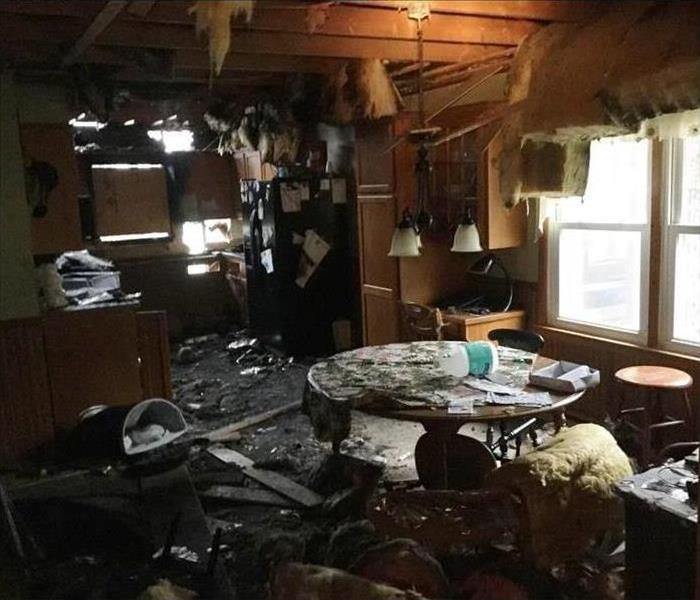 House fire
House fire
A fire is a traumatic event, and if you've experienced one, you know that it can be difficult to deal with the aftermath. Along with structural damage, smoke and soot can cause mold growth in your home's walls, ceilings, and floors. If not dealt with quickly — and properly — mold growth will spread throughout your home and make rebuilding more expensive than necessary.
Mold can grow after a fire if the area is not dried quickly enough.
Mold is a fungus that grows on organic materials. To grow, it needs moisture and oxygen. It can be found everywhere in nature, but it's difficult to spread without the help of humans.
For example, after a fire occurs in your home, you will have an opening in one of the walls where smoke and heat have damaged the drywall. If this wall isn't repaired quickly enough (and if there are other factors that allow moisture to enter), mold spores could start growing on exposed wood or other materials inside your home.
How mold spreads after a fire.
In addition to the immediate damage caused by fire, there's also the potential for mold growth. Mold spores are everywhere, but a fire creates an environment that makes it easy for them to grow.
If you have a house fire and you're concerned about your home's susceptibility to mold growth, don't fret: there are ways you can ensure that your home doesn't become infested with mold after a fire.
What to do with the contents:
The contents of the room should be removed and discarded if they cannot be cleaned. If they can be cleaned, wash them in hot water and detergent, then dry them in a well-ventilated area. Do not use bleach or other harsh chemicals to clean things like clothes that may have been exposed to smoke or mold spores during the fire. Once everything has been thoroughly cleaned and dried, leave the door open so that air can get in and out of the room for several days until it is completely dry again.
The Fire Damage Restoration Process Includes Mold Remediation
The time it takes for mold to grow in your home depends on a variety of factors, including the size of the room, how much water is present and whether there was smoke damage. In general, however, it grows faster than you might think: 48 hours is common for indoor environments.
Mold is not only unsightly and may even affect your health, but also expensive to remove once it has set in—and insurance companies won't cover it unless they deem it an "act of God" (which can be hard to prove). Even if you do have insurance coverage for fire damage or other structural issues that resulted from a fire event (or any other emergency), you'll want to know what types of materials are covered so that you don't end up paying out-of-pocket just because something wasn't explicitly covered under your policy.
If you're concerned about whether there's visible evidence of mold after an emergency has occurred at home or work—or if there's reason to believe that such contamination could be imminent—call us today!
Call a professional fire restoration company to restore your home after a fire.
You should call a professional fire restoration company to restore your home after a fire.
- Mold can grow fast in a fire-damaged home and spread quickly if not controlled.
- A professional fire restoration company will use specialized equipment to remove mold, contain it, and prevent its reoccurrence.
I hope that this article has helped you understand the importance of dealing with mold in your home after a fire. Fire damage can be devastating, but it’s not something that you have to deal with alone. There are many resources available today for people who experience this type of loss. By calling a professional fire restoration company like SERVPRO or another local business, you will be able to get the help that you need to recover from your loss as quickly as possible so that life can go back to normal once again.
What Effect Does Water Have on Building Materials?
11/21/2022 (Permalink)
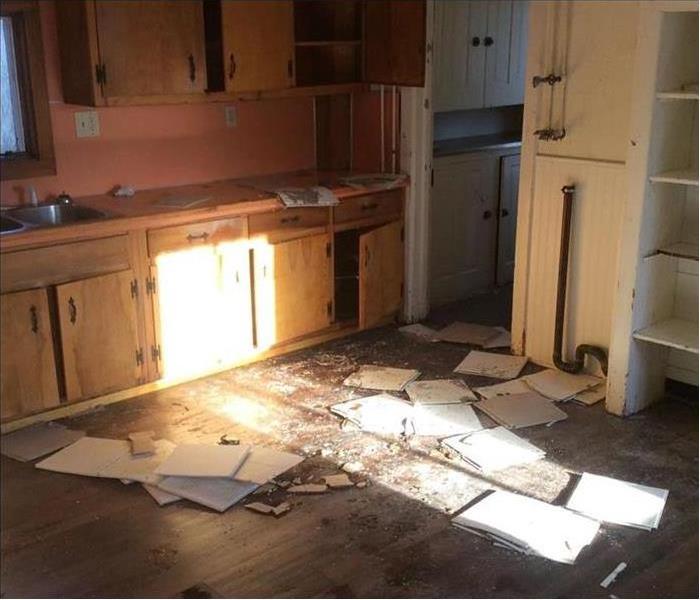 Water damage in a Sunbury, PA home.
Water damage in a Sunbury, PA home.
How Does Water Affect Building Materials?
Water can be one of the most devastating forces for destruction in the world. When water damage is not addressed quickly and properly, it can cause permanent damage to your home and belongings. There are many different types of building materials that can fall victim to water damage if not handled correctly. This article will explain some of the effects that water has on different materials and how you can protect yourself from them in your own home!
Here are some of the effects that water can have on different building materials.
Water can cause a variety of issues in building materials, but for the most part, it's more of an issue when water sits on the surface for an extended period. Water damage is usually noticed when there's a leak in your roof or window and you notice some water damage near those areas.
Water can also affect the structure of your walls by causing them to swell when it gets wet (especially with wood). The wood expands as it absorbs moisture from the air, but when this happens continuously over time, especially if there's not enough ventilation between the studs, then cracks may start forming in the structure of your walls which could lead to structural failure later down the road if it's left untreated.
Wood
Wood is a natural material and as such it has both advantages and disadvantages. When wood absorbs water, it expands. Therefore, you may find that a wooden doorframe becomes loose or even breaks when water gets into the frame. When wood dries out after being exposed to water, it shrinks and can cause the boards in your home to split or warp.
Wood can be dried slowly with fans, but this can take several days and during that time mold might form if adequate ventilation isn’t provided. If your house has been flooded by storm waters or heavy rains, you should consider using an electric dehumidifier instead of fans because they will dry out the wood faster than fans alone would do so.
Aluminum
Aluminum is a metal that can be affected by water, but it is not as sensitive to corrosion as some other materials. This does not mean that you should ignore your aluminum collection, however. If water damage has occurred, you will need to assess the damage and repair any permanent effects quickly.
Depending on how much time has passed since the original incident and how much exposure there was to moisture and/or chemicals in the environment, aluminum may suffer from oxidation or rusting. The best way to prevent further corrosion from affecting your building material is by removing all traces of oxygen from it and sealing it with a protective coating such as wax or paint.
Concrete and Masonry
Concrete and masonry materials are porous, meaning they can absorb water. When exposed to water, these materials can absorb it and expand. This is called hydration and causes the concrete to become soft. As the concrete expands it can crack or even crumble in some cases.
Steel
Steel is one of the most common building materials used in homes. Steel is generally immune to damage if they get wet, which means it can be used to build a wide variety of structures. Steel is also resistant to corrosion, which means it will last a long time if it is properly maintained.
When you have a water damage, it's important to act quickly so that your home doesn't suffer permanent damage!
If you have a flood, contact your insurance company immediately and let them know what happened. Don't let the water sit for too long or try to fix it yourself—that'll just make things worse. Call a professional water damage restoration company like SERVPRO of Lewisburg/Selinsgrove who can help get rid of all the moisture in your home and get everything back to normal again.
In conclusion, water can be very damaging to your Sunbury, PA home. It's important to act quickly when you notice water damage so that your house doesn't suffer permanent damage!
Is Security Fencing Really Necessary?
10/7/2022 (Permalink)
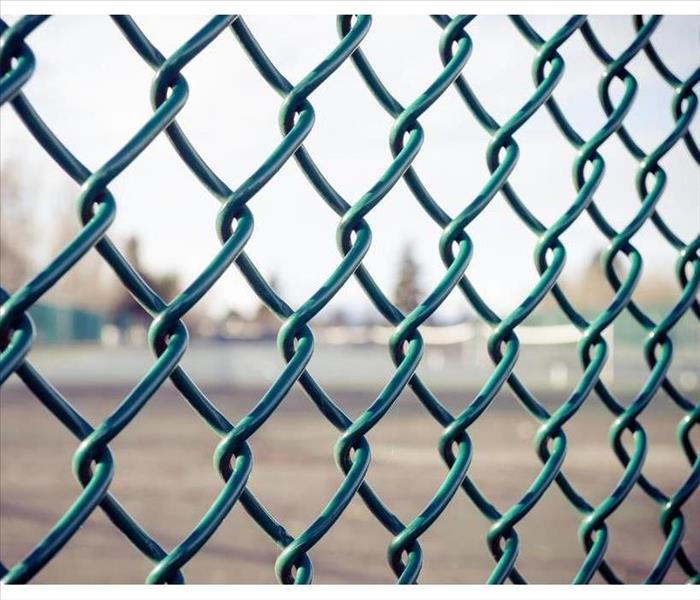 A security fence is a fence that is used to secure a property.
A security fence is a fence that is used to secure a property.
Fire and water damage can be devastating to a home or business, and it's important to take steps to secure the property after an emergency. A security fence is an effective way to deter break-ins while you're working on your repairs. Security fencing can also help prevent other unwanted guests from entering your property, such as vandals or trespassers.
What Is a Security Fence?
A security fence is a fence that is used to secure a property. They are also referred to as protective, security and privacy fences. They provide protection from intruders, as well as provide privacy for the occupants of the property.
- Security fencing can be used for commercial properties. This includes businesses like restaurants, clubs, shops, and supermarkets.
- Security fences can be used for residential properties such as homes and apartments.
- Security fencing can be used on fire damaged properties where there was once fencing there before but it has been damaged or destroyed by firefighting efforts during the event of an emergency situation like a bushfire or house fire, etc.
Why is it important to secure your property after a fire?
You may have just experienced a traumatic fire and are now looking for ways to secure your property so that it will not be damaged further. Some of the reasons why you should do this include:
- To prevent theft/vandalism. When people find out about a fire in the neighborhood, they often come out of curiosity or even try to take advantage of others' misfortune by committing crimes such as theft or vandalism themselves (usually because they don't see anyone around). While security fencing may not completely stop someone from committing these acts, it can deter them from doing so.
What are some examples of security fencing?
You may have seen security fencing in the news. It's a popular form of perimeter protection for businesses and private residences, but it can be used for much more than just keeping people out. Security fencing is an effective way to keep people safe and secure, whether they are indoors or outdoors.
Here are some examples of when security fencing might be necessary:
- If you want to secure an area from intruders, such as your backyard if you're hosting a party at home
- To protect children in playgrounds where there are no walls or fences around play equipment
- To protect vulnerable adults while they go out shopping or working
How does SERVPRO use its security fencing?
When you have fire damage or other restoration needs, SERVPRO uses its fencing to secure the property so that no one can enter or exit. When your home has been damaged by water from a flood, fire, or mold, SERVPRO uses its fencing to keep animals out of the property.
Security fencing can be used for many different projects; SERVPRO uses it with fire damaged properties.
Security fencing is a great way to protect your property from theft and vandalism, as well as prevent unauthorized access. It’s also used to deter fire damage and can be used at industrial locations where flammable materials are handled or stored.
SERVPRO uses security fencing to secure properties that have been damaged by fires, water damage, mold removal, storm damage or other disasters. We want you to feel safe and secure in your home or business during this stressful time, so we make sure our crews install the highest quality fences for each project.
Security fencing is important for properties that need to be protected from theft, vandalism, or other criminal activity. It can also be used to help secure fire damaged properties and prevent further damage, as well as help homeowners feel safe when they return home after a fire. Security fencing can be used on its own or in conjunction with other security measures like cameras or alarms.
These 3 Qualifications Are Needed To Become an Insurance Company's Preferred Vendor
10/1/2022 (Permalink)
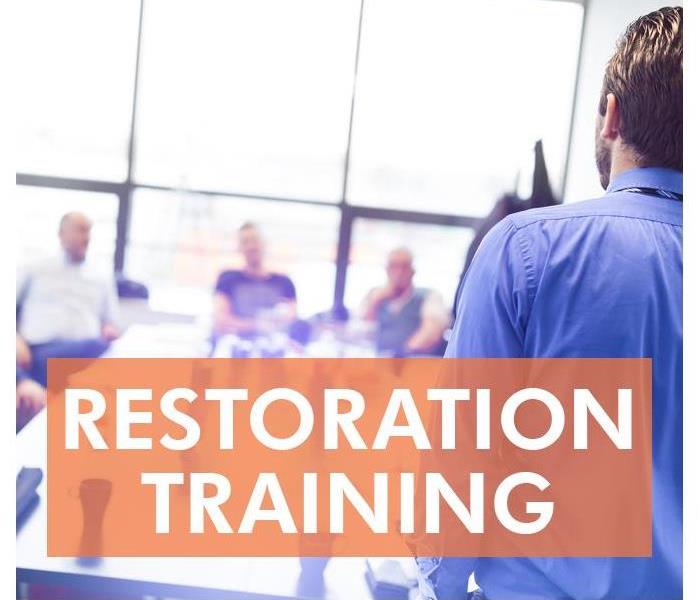 SERVPRO is approved to provide training by the IICRC
SERVPRO is approved to provide training by the IICRC
These 3 Qualifications Are Needed To Become an Insurance Company's Preferred Vendor
When you're an insurance agent, and one of your clients in Lewisburg, PA, has suffered loss through flooding or other disasters, you need qualified and reliable cleaning and restoration professionals for your vendor program who will get the job done quickly and efficiently.
You need a team of assessment professionals to arrive on the scene fast so they can itemize the damage. They provide you with important information you need to restore your client's property "Like it never even happened." Because your decision is accurate, you save your insurance company money.
These cleaning and restoration professionals have the qualifications you need for your preferred vendor list.
1. Excellent Documentation To Help You, the Insurance Agent, Process Claims Faster
As soon as assessment professionals arrive on the site, all information, including a detailed inventory of the damage, is logged on to the electronic claims system. You get every detail and photograph as soon as that information is created. That way you can process insurance claims faster, making your clients happy. Because the information is accurate, you also save your insurance company money.
2. National Account Guidelines
National Account Guidelines ensure that professionals meet the highest standards by using internal audits and requiring completed job files for proof of work. The company also does background checks on all employees, including temporary workers. There is always step-by-step communication between local staff and the insurance adjuster or agent. You, the insurance agent, are never left out of the loop.
3. IICRC Validation
SERVPRO is approved to provide training by the Institute of Inspection, Cleaning and Restoration Certification. It’s a nonprofit organization that upholds the highest standards in cleaning and restoration. Only a company that teaches high-quality cleaning services will be able to do the professional job you need.
Restoring your client's property after a disaster can be challenging, but with the assistance of professionals, your job is made easier.
Cooking Grease: Trash It, Never Drain It
8/27/2022 (Permalink)
Cooking Grease
Bacon is a breakfast staple in many households across the country. When cooking bacon in a skillet, a lot of grease can form. While pouring this grease down the drain may seem like a good idea, it can result in a drain clog and issues in the sewer system. The best practice is to throw it away. However, there are some steps you must take to toss your cooking oil out safely.
1. Cool Grease to Prevent a Fire
If you try to pour your grease into a container or the garbage while it is still hot, it can cause burns to your skin or cause a fire in your trash can. It is very important to allow the grease to cool slightly. You want it to be warm enough to flow easily, but not so hot that it is a danger to yourself or your house.
2. Pour Grease to Prevent a Mess
If you pour your grease down the sink and get a drain clog, then it will be a much bigger mess than you were expecting. The trash is the best place to pour the cooking oil, but make sure that you empty it into a plastic or metal container with a lid before placing it into your garbage bin. Since you have allowed the grease to cool, it won't melt your container. Be sure to allow it to finish cooling once you have transferred it into the chosen receptacle.
3. Throw Grease to Prevent a Sink Clog
Once your grease is done completely cooling, make sure to throw it into the garbage. Dumping oily items down your sink can cause build-up. Oftentimes when a clog gets cleared, homeowners have found grease in drain pipes. It's important to not allow cooking oils to enter your drain systems at all.
Dealing with damage caused by a drain clog in Sunbury, PA, can be a frustrating experience. The best option is to never allow grease to go into your drains. If you do ever find yourself with water damage from clogs, contact a professional cleanup and restoration specialist.
Lightning Safety Tips
8/27/2022 (Permalink)
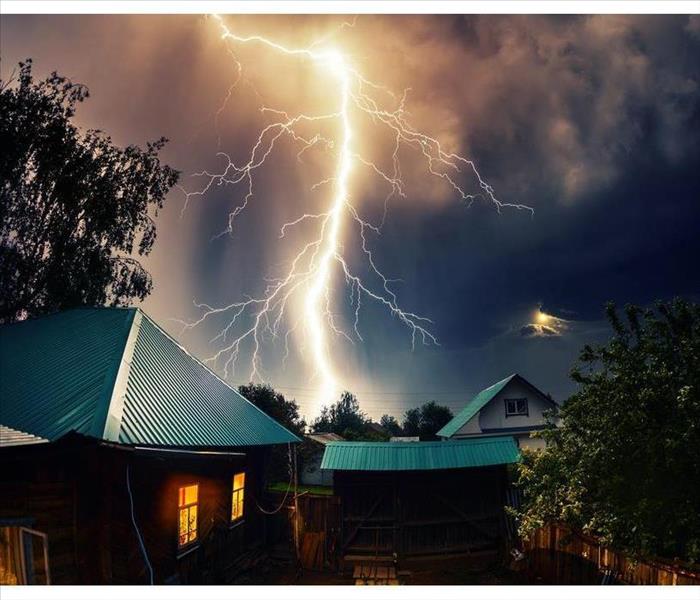 Protecting your home in Shamokin, PA, from fire requires a certain amount of vigilance.
Protecting your home in Shamokin, PA, from fire requires a certain amount of vigilance.
Protect Your Home From Lightning Fire
Protecting your home in Shamokin, PA, from fire requires a certain amount of vigilance. During storm season, the risk is higher due to an increased number of thunderstorms. The good news is that there are several things you can do to protect your home from a lightning fire and keep your family safe.
Prime Strike Times
While a strike can occur any time certain atmospheric conditions are present, there are specific times you should be especially mindful:
- During summer months
- Afternoon and early evening
- Prime thunderstorm season for your region
In areas with prolonged rainy seasons, lightning strikes may be more common. Stay weather aware, and consider adding upgrades to your home that make it less susceptible to fire damage during a storm.
House Fire Risk
You can't really control where a strike happens, but there are certain measures you can take before and after a storm to reduce the chance of a lightning fire. If you believe your house was struck during a thunderstorm, fire restoration specialists can assess your property to check for damage. A whole-house surge protector can be installed on your electrical panel to protect your outlets and anything plugged into them. Something as simple as unplugging electronics when you know a storm is on its way can be helpful, too.
Personal Safety Strategies
You should always seek a sturdy shelter during a thunderstorm. No place outside leaves you safe from a strike. Even inside your home, it's a good idea to stay away from using corded devices or anything attached to a plumbing line, as both can transfer electric charges from outside directly to you.
While there are many precautions you can take against a lightning fire in your home, there's no substitute for astute attention. If a strike sounds like it lands anywhere nearby, have your home checked for damage as soon as possible.
Tips for Preventing a Cigarette Fire in Your Home
8/27/2022 (Permalink)
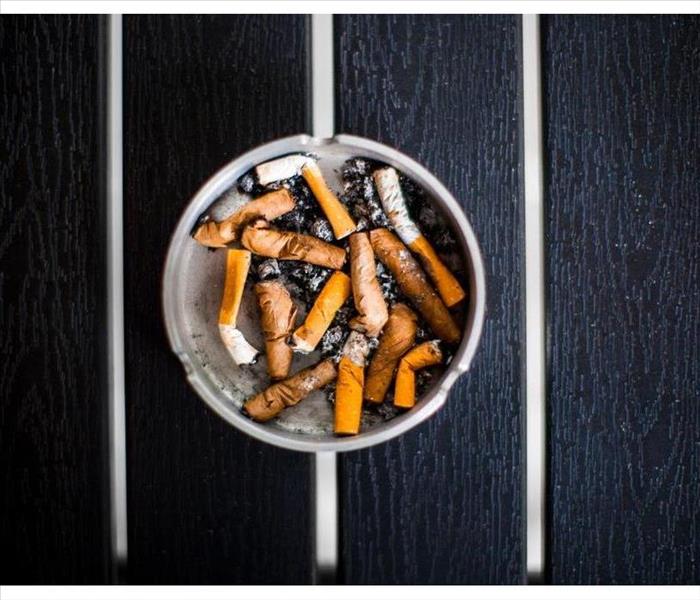 Use an ashtray to extinguish cigarettes
Use an ashtray to extinguish cigarettes
Advice on Preventing a Home Fire Caused by Cigarettes
A fire that occurs at your home in Milton, PA, can have long-term consequences and lead to significant losses. Sometimes, the cause is faulty wiring or an unpredictable event. However, a cigarette fire is avoidable if you follow these tips.
Eliminate the Risk of a Cigarette Fire by Smoking Outside
Smoking indoors increases the risk of fire and leads to other issues, including:
- Stubborn smoke odors in fabrics
- Discoloration of walls and ceilings
- Air contamination
When smoke and ash compromise a home's interior, a smoke restoration service must employ powerful techniques to address the damage. Therefore, smoking outside can help you avoid unpleasant and lingering stains and odors inside your home while reducing devastating fire risk.
Use an Ashtray To Extinguish Cigarettes
Many home fires happen because smokers carelessly use floors and other flammable surfaces to put out their cigarettes. Using an ashtray to extinguish a cigarette and catch ashes can go a long way toward preventing residential fires. However, leaving a burning cigarette unattended can still cause an ashtray fire.
Never Smoke in Bed
Smoking in bed remains one of the leading causes of house fires and should never be an option. Accidentally dropping a cigarette while falling asleep can cause it to ignite flammable textiles and furniture, causing a fire that spreads within minutes.
Avoid Throwing Cigarettes on Exterior Vegetation
The landscape around your home may include trees, bushes, and flowers with thin or thick branches. They are highly flammable when they come in contact with a cigarette. The flames can quickly travel to your home's exterior structure and work their way inside, where they can destroy its contents.
Never Smoke Near Medical Oxygen
Smoking in a home where someone uses medical oxygen can lead to a fire that burns faster than other types. Fire cleanup measures may not be sufficient to recover from the damage medical oxygen fires cause.
A cigarette fire is avoidable when you take precautions while smoking, but this type of fire is still the most common cause of residential fire damage in Milton, PA.
Spring Cleaning and Rain Storms in Milton and Surrounding Areas
4/13/2022 (Permalink)
April bring May flowers- and warmer weather! Now is the time to start thinking about spring cleaning projects around your home or business, and SERVPRO of Lewisburg/Selinsgrove does more than just Emergency Service. Time to get those carpets cleaned after a long, messy winter. You should also consider having your air ducts cleaned to clear out the dust and pollen that's collected. How about pressure washing your home or garage? Give us a call at 570-523-3300 and see how we can help you with your Spring cleaning!
Another worry that goes with Spring is those those pesky rain storms. Make sure that your basement stays dry. Even exterior ground moisture can have an affect on your finished basement area. If you see mold, give us a call for an on-site inspection and estimate. Not only can we resolve your situation but we will also provide valuable information on how to avoid it in the future. A clean home is a safe home!
Please Do NOT Turn the Equipment Off!
4/13/2022 (Permalink)
Here at SERVPRO of Lewisburg/Selinsgrove we understand that having a water damage in your home or business can be overwhelming. On top of losing your possessions and having to potentially reconstruct your property, the equipment is noisy and can become bothersome. When you call SERVPRO of Lewisburg/Selinsgrove to mitigate your water damage, our professional technicians will place the recommended pieces of equipment in specific areas to dry it out as quickly as possible. It is VERY important to follow our instructions and keep the equipment running and in place at all times. Turning off or moving the air movers and/or dehumidifiers can delay the drying time and can cause further damage to your property such as it need it to be torn out and replaced, and even mold growth. Typically your insurance coverage will only pay for air movers and dehumidifiers for a certain amount of time and our technicians need adjuster approval beyond that time frame in order for your insurance company to pay. Our trained and certified technicians take moisture readings and monitor the equipment daily to ensure the appropriate placing and time for removal. Be sure to talk to our technicians if you have any concerns about anything on our jobs.
Do You Know the Importance of Business Interruption Insurance?
4/11/2022 (Permalink)
Most business owners already protect their investment by purchasing property insurance, but most do not know property insurance doesn't pay for the income you lose while their business is inoperable. Interruption insurance can help keep your business from suffering financial distress while you wait for needed repairs. See what business interruption insurance can do for you:
- Replaces Lost Income
Depending on how severe your damage is, it could take weeks or even months to fully restore your business to preloss condition. During this business interruption, you may not be able to operate at all, or may only be able to operate at reduced capacity. This coverage replaces income lost based on your past financial records, as long as is a covered cause of loss - Helps You Pay the Bills
You will need to pay the mortgage or rent on your facility, as well as any utilities that still need to be connected when your business isn't operating Don't forget about making payments on any business loans, paying your taxes and any other business expenses. - Provides Money To Pay Employees
Your employees probably can't afford to go without a paycheck while your business is shut down due to a loss. This insurance helps you keep employees on the payroll so that you don't need to hire new employees after you reopen.
Dryer Vent Preventative Tips
4/11/2022 (Permalink)
There are many things that can cause damage ro your home. As a homeowner or business owner, it is imperative that you are aware of, and perform, the preventative maintenances that help keep your property safe. One of the lesser known maintenances is to keep your dryer vents lint free. Here are some tips to keep your dryer working efficiently and to reduce your risk of a lint fire:
- Regular Dryer Maintenance- Make sure that you clean your dyer's lint filter after every use. Quarterly you should clean out any built-up lint where the filter is housed and as well from your dryer into your vent pipe.
- Outside Dryer Vent- Remove the cover over the access to where your dryer vent is piped outside. Check that the cover is free of debris, and clean inside the exhaust to ensure that there are no nests or lint build up.
- Pay Attention to Warnings From Your Appliance- Any unusual noises or smells, as well as longer than usual drying times, need to be handled handled by a professional repair person that is qualified for your specific appliance.
Call SERVPRO of Lewisburg/Selinsgrove for your dryer vent cleaning today!
2002 Hurricane Season Information
4/11/2022 (Permalink)
See These Safety Tips From Weather.gov
"Hurricanes are among nature's most powerful and destructive phenomena. On average, 12 tropical storms, 6 of which become hurricanes form over the Atlantic Ocean, Caribbean Sea, or Gulf of Mexico during the hurricane season which runs from June 1 to November 30 each year.
While hurricanes pose the greatest threat to life and property, tropical storms and depression also can be devastating. The primary hazards from tropical cyclones (which include tropical depressions, tropical storms, and hurricanes) are storm surge flooding, inland flooding from heavy rains, destructive winds, tornadoes, and high surf and rip currents.
- Storm surge is the abnormal rise of water generated by a storm's winds. This hazard is historically the leading cause of hurricane related deaths in the United States. Storm surge and large battering waves can result in large loss of life and cause massive destruction along the coast.
- Storm surge can travel several miles inland, especially along bays, rivers, and estuaries.
- Flooding from heavy rains is the second leading cause of fatalities from landfalling tropical cyclones. Widespread torrential rains associated with these storms often cause flooding hundreds of miles inland. This flooding can persist for several days after a storm has dissipated.
- Winds from a hurricane can destroy buildings and manufactured homes. Signs, roofing material, and other items left outside can become flying missiles during hurricanes.
- Tornadoes can accompany landfalling tropical cyclones. These tornadoes typically occur in rain bands well away from the center of the storm.
- Dangerous waves produced by a tropical cyclone's strong winds can pose a significant hazard to coastal residents and mariners. These waves can cause deadly rip currents, significant beach erosion, and damage to structures along the coastline, even when the storm is more than a 1,000 miles offshore."
See more:weather.gov
NOW is the time to get your ducts cleaned!!
4/10/2022 (Permalink)
NOW IS THE TIME!
Spring is in the air- which also means it is in your ducting system! Allergens, like pollen, dander and dust particles, get sucked into your ducting system and subsequently blown around your business (or home). These contaminants also accumulate in your ducting system and cause your heating or cooling efficiency to drop as much as 25%-40%, as well as your air quality being affected. When your efficiency drops, your system has to work harder to produce the same sort of effects, which can lead to more maintenance or service repairs.
With heating season dwindling down and summer quickly approaching, now is the perfect time to get your business's ducts cleaned. Give us a call at SERVPRO of Lewisburg/Selinsgrove at 570-523-3300. Our highly trained technicians will come take a look at your unit and ducting, give you a reasonable quote, and have your businesses air quality like new!
Solar Panel Storm Damage Information
4/10/2022 (Permalink)
Lewisburg, Selinsgrove, and surrounding areas experience all kinds of different storms throughout the year. Many of these storms cause little concern and do little damage to your home. However, high winds, rain, and other conditions may be a concern to the owner of solar panels.
Hail Stones
Hail storms may not be common in your area, but they can create various problems for property owners. You may wonder about panel damage if hail starts falling, but you can have peace of mind knowing that these panels should not be affected.
The panels are made of tempered glass and highly flexible material, and are built to withstand impact from rock, hail or other materials.
Wind
While high winds can cause roof damage, they are much less likely to cause panel damage. Your solar panels are designed to withstand up to 140-mph winds. This means they can hold up against hurricanes and other less potent storms.
Snow and Rain
If you purchase a high-quality set of panels, they should last 25 years or more. They are well-equipped to handle a rainstorm or a snowstorm. The glass portion of the panels has protection from any negative effects from precipitation.
Are Clog Removers an Option?
4/8/2022 (Permalink)
When your drains are clogged, the first thing someone would think to do is reach for the clog remover. However, there are certain situations in which drain cleaner should never be used to prevent more damage from occurring:
Plastic Pipes
The chemicals in drain cleaner react together to transfer electrons to and from organic substances, causing them to break down. This process also produces heat- that's how they force their way down further into the pipe. These two factors mean that they can warp or eat through softer pipes, like plastic. The three types of cleaners you should stay away from if you do have plastic pipes are:
- Sulfiric or muriatic acid cleaners
- Lye or caustic potash cleaners
- Bleach, peroxide or nitrate cleaners
Old Pipes
Old pipes will have a lot of the same problems as plastic pipes, because they are brittle and delicate. If you discover that your pipes are old or rusting, you are probably better off replacing your plumbing rather than using a clog removing agent.
Total Blockage
Often, drain cleaners won't be able to clear a clogged drain if there is a solid mass of hair, oil or debris completely blocking the flow of air and liquid. If they are used in these situations, the cleaner ends up sitting there above the clog. Given enough time the strong chemicals may cause some real damage to your pipes.
Instead of chemical cleaner, you can try vinegar/baking soda and hot water, or biological options like a drain snake.
SERVPRO of Lewisburg/Selinsgrove Busy with Fire Calls!
1/22/2022 (Permalink)
Fires in homes are one of the leading calls we get from customers this time of year. The Red Cross has made this information available in order to hopefully prevent this from happening. See some important facts below:
When do home fires happen?
Home fires can happen at any time, but they generally increase during the fall and winter, with December and January being the peak months. Home fires are also more common on Saturday and Sunday, and tend to peak between 6:00 and 7:00 PM.
Where are home fires most likely to start?
Home fires are more likely to start in the kitchen than any other room in the home. The second leading cause of home fires are heating sources like wood stoves, and fireplaces. Fires caused by smoking are the leading cause of deaths.
Who are affected by home fires?
Home fires don’t discriminate and can affect any home at any time. However, children under five and adults over 65 face the highest risk of dying in a home fire
Find more information here: Red Cross Fire FAQs.
If you or someone you know experiences a fire in your home, call SERVPRO of Lewisburg/Selinsgrove so we can help you!
Get Your Commercial Property Ducts Cleaned Today!
1/19/2022 (Permalink)
Are you the owner of a business or do you manage a commercial property in Selinsgrove, Lewisburg or in the surrounding areas? SERVPRO of Lewisburg / Selinsgrove provides exceptional commercial duct cleaning services! There is no job too big for our highly trained SERVPRO technicians.
Although most businesses tend to have their HVAC systems serviced yearly or bi-yearly, often times they don't realize the importance of having their ducts professionally cleaned. The duct system provides the airflow for every space in your building and should be maintained often.
Here are some benefits of having your commercial ducts cleaned:
- Helps to maintain peak energy efficiency.
- Eliminates offensive odors.
- Reduces the potential for mold growth and spreading.
- Helps prevent the spread of airborne allergens and bacteria.
Give us a call today at 570-523-3300!
SERVPRO Knows About the Art of Drying!
1/12/2022 (Permalink)
Did you know there is actually a science behind the process of drying? Having the knowledge of psychrometrics is essential to restoring a water-damaged structure to its preloss condition. While your initial reaction may be to grab a few towels to mop up the mess and place a fan or two around the damaged area, SERVPRO of Lewisburg/Selinsgrove professionals are trained in the science of drying and follow strict industry approved standards to help lower the chances of any secondary damages. If your home or business suffers a water damage, our technicians will:
~Inspect the structure to detect every area that is wet to ensure all affected areas are remediated.
~Measure how much moisture is in wet materials and monitor whether the materials are drying properly.
~Use professional grade equipment to ensure the fastest and proper drying.
SERVPRO of Lewisburg/Selinsgrove have the knowledge, experience and equipment to ensure your structure dries properly which includes equipment to help dry hardwood floors, tough-to-reach spaces inside walls, and much more. Our technicians also use state-of-the-art monitoring equipment and a proven scientific process to help speed the drying of your home or business.
SERVPRO® has developed DryBook™, a proprietary tool that provides real-time documentation and updates on the drying process and helps ensure industry drying requirements are met. With DryBook™ Mobile, you have the ability to know exactly where your property is in the drying process.
The bottom line? SERVPRO of Lewisburg/Selinsgrove is the best choice to ensure your property is properly dried and remediated. Call the professionals at SERVPRO today at 570-523-3300!
Happy New Year From SERVPRO of Lewisburg/Selinsgrove!
1/3/2022 (Permalink)
HAPPY NEW YEAR!!!
Everyone here at SERVPRO of Lewisburg/Selinsgrove would like to wish everyone a safe and healthy new year. We're thankful for our customers and the opportunities we've been given to grow with our community!
SERVPRO of Lewisburg/Selinsgrove has been serving our local community for many years as the preferred remediation company in the area. On top of helping homeowners and businesses with their water/sewer, fire and mold damages, we provided many other services. Our range is from, but not limited to, carpet and area rug cleaning, whole house cleaning, COVID-19 disinfecting, removing graffiti and debris, biohazard remediation, odor and smoke removal and duct cleaning, just to name a few.
Give us a call today at 570-523-3300 for your cleaning and remediation needs. We service from Mount Carmel to Middleburg, back to Muncy- and anything in between! Our sister franchise (run out of the same office in Muncy) covers from Muncy Valley to Lock Haven to Trout Run and all surrounding areas.





 24/7 Emergency Service
24/7 Emergency Service










